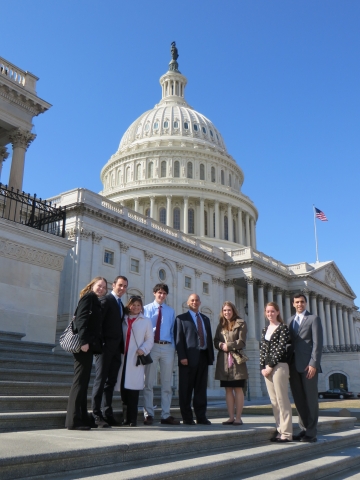 Do business and politics mix? An undergraduate Public Policy major at Bentley University — one of only a handful in the U.S. — is advocating strong support in favor, as business-minded students make an impression on movers and shakers in Washington, D.C., and on Boston’s Beacon Hill.
Do business and politics mix? An undergraduate Public Policy major at Bentley University — one of only a handful in the U.S. — is advocating strong support in favor, as business-minded students make an impression on movers and shakers in Washington, D.C., and on Boston’s Beacon Hill.
“It’s about being smart about the political process and also understanding how to solve problems by managing people, working on teams and digesting information,” says Jeff Gulati, associate professor of political science and director of the Public Policy major at Bentley. “There’s a gap in the industry of people who can speak both languages.”
Bentley’s program differs from traditional ones that teach public policy simply as a subfield of a political science program. It also integrates with business studies to provide a set of tactical, tangible skills to work in government, lobbying or political consulting, for a think tank, or on the corporate side.
As part of a capstone project, Public Policy majors have the opportunity to spend spring break in Washington, D.C. The week-long trip includes networking with Bentley alumni working at organizations such as the Federal Reserve Board, U.S. Navy, Brookings Institution, Booz Allen Hamilton and CNN. Meeting with members of Congress, senators and their staff on Capitol Hill and sitting in on lobbyist roundtables provide an understanding of the pressures from many different stakeholders and also the stake that organizations have in public policy.
“What you really see when you’re there is the relationships that exist and how people interact with each other,” Gulati notes. “That’s hard to explain in the classroom. You really need to see that in action.”
A partnership between Bentley and The Washington Center opens the door for a six-credit semester-long course in D.C. that includes a full-time internship (35 hours a week) with a government, nonprofit or private organization. The advantage, says Gulati, is an immersion into the larger policy network with more time to learn about the personal relationships that matter for policy success and the culture of Washington, D.C. “Thanks to the media and political TV dramas like House of Cards, many students arrive with a very cynical view of politicians and the process. But they leave knowing that there are a lot of people trying to do the right thing and make the world a better place.”
Many students participate in internships once reserved for political science majors from other schools. At the Massachusetts State House, Amanda Wagner ’14 leveraged marketing skills for an internship in the Communications Department at the House Speaker’s office. She credits her business background as a deciding factor in landing internships and her full-time post at Verisk Health as associate marketing proposal writer. “Employers said I was different from political science students who would traditionally apply for these jobs; they appreciated that I understood the business side of things. The skill set is definitely unique.”
Jacob DeMasi ’15 served on the staff of State Senator Karen Spilka (Ashland).
“I spent hours talking to the constituents to understand what obstacles they faced in their lives, inspiring me to act as their advocate as best as my position allowed,” DeMasi recalls. “I was able to communicate their problems to the staff and the Senator, allowing her to offer new legislation to the General Court.”
Business sense matters when it comes to politics, says Rob DeLeo, assistant professor of global public policy at Bentley. “Although government may not be driven by the same bottom line as private firms, “money” still matters. Our students are able to recognize that policymakers are concerned about the state of the economy and the well-being of industry.”
The Public Policy major teaches how to navigate the waters of government and leverage power in ways that support both politicians and industry.
“The notion that the public and private sectors are two distinct spheres simply isn’t true,” says DeLeo. “Graduates can work in a legislative setting, but they also have a distinctive skill set that allows them to work in a consulting firm, for example. Broadly speaking, they are well-positioned for careers in both worlds.”
Gulati points to a civic-minded generation with ready access to political news and an overall awareness about what’s going on. The recession also contributed to a better understanding of the government’s role in economic issues. “You understand that what happens in Washington matters. And millennials want to be a part of the process.”
Wagner is a case in point. “My family is very open when it comes to talking about politics, and my father advised me to read and watch the news. When I took Professor DeLeo’s course [U.S. State and Local Politics], I enjoyed learning about the structure of government and how it affects everyone on the state and federal level. I switched from Marketing to double major in Public Policy and Business Studies.”
DeMasi also points to early influencers. “Throughout my life, I’ve seen good people struggle to make it or even secure their basic rights, and my family always encouraged me to go out and fight for what’s right,” says the former Managerial Economics major. “When I heard about the Public Policy major, I knew I would still get a solid business education while learning about the policy process and its effects on people.”
Gulati seconds that. “It goes beyond conducting research or writing reports. There are opportunities to make a very comfortable living while having a real impact in improving people’s lives. Our students understand that they can be a part of something special.”

